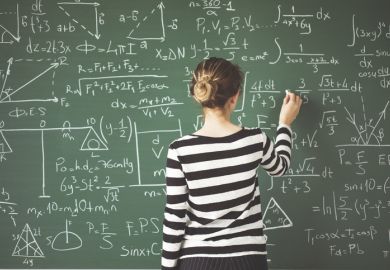Over the past few years, many books have appeared on the subject of time, and especially the flow of time. There is, of course, Stephen Hawking's A Brief History of Time , and there are books by Huw Price, Steven Savitt and Paul Davies. Igor Novikov's The River of Time is a valuable addition to this literature, written in a fluent, engaging, enjoyable style.
It has a twofold aim. The first is to present an introduction to the concept of time as it appears in classical mechanics and relativity. The second is far more ambitious, summarised by the book's jacket, which asks: "Can we change the past? The surprising answer to this question can be found in the final chapters of this book."
Before getting to the big issues, let me start with two minor cavils. In the chapter entitled "Holes in space and time'', Novikov mentions the discovery of the black-body residual radiation and attributes it to his colleague, Joseph Shklovsky. It is strange that he does not mention the celebrated work of Ralph Alpher, George Gamow and Robert Herman, dating from 1947, in which they predicted the existence of this radiation and the correct order of magnitude of its temperature. Although one of the appealing aspects of this book is that it gives a better insight into the Russian literature on cosmology, still I regret this omission.
Second, there are several statements that may confuse the general reader to whom the book is addressed. For example, Novikov introduces imaginary time, following Hawking, but does not make clear that imaginary time is limited to very specific problems (in technical terms, problems associated with analytic continuation). If we were to replace time with imaginary time in a diffusion equation or in the Schrodinger equation of quantum mechanics, diffusion would become time reversible (past and future would play the same role) and the Schrodinger equation would describe irreversible processes in which there is a basic distinction between past and future.
Now for the deeper problems. Novikov writes several times that time breaks into indivisible quanta at the moment of the big bang. For instance:
"Science has discovered that the properties of time at the very first moment after the birth of our Universe were very different from what we observe today. Time existed then as individual quanta.'' He bases this claim on an assumption that any time interval shorter than the "Planck time" (1044 seconds) must needs be quantised. True, it is difficult to imagine how such a small interval could be measured by a macroscopic apparatus - but Novikov goes beyond this and states that space-time itself is quantised. At present this can be no more than a hypothesis. We would be in a better position to judge it were the quantum theory of gravitation in a more advanced state.
Much room is given to "white holes''. The idea is that when a spaceship enters a black hole, it may emerge through a white hole in a different place in space-time or even in a different universe. The transition from the entrance to the black hole to emergence from the white hole is conceived of as a tunnel or gorge. Novikov admits that this is still controversial; that we are here standing at the frontiers of science, and many things will have to be checked and modified. But then he uses the idea of such gorges or tunnels as the essential element in his models of time machines that could take us back to our past. He makes no clear distinction between science as it stands today, with all its doubts, and a model that presents his own personal view.
The introduction of time machines leads to time loops, in which events at given moments are influenced by the past and the future. In this case there would be no difference between past and future. But we would then come close to a timeless deterministic world. It is difficult to imagine the entry of a spaceship from our evolving world into this timeless world, and vice-versa. At any rate, we are far from answering the question: "Can we change the past?" Novikov presents his own extrapolation; it is fun to read; but its relationship with reality is uncertain.
Leaving aside time machines, let me consider the flow of time. "What produces the flow of time and why in a single direction only?" asks Novikov. He writes that "there is still not a generally accepted answer to this question". But when, elsewhere in the book, he asks: "Where and how does irreversibility perish?", he states that this second puzzle was solved in the 19th century. Since I have spent decades on these very difficult questions, and their interrelationship, let me comment on them at some length and, by necessity, in somewhat technical language.
The first to note the conflict between the Newtonian time-reversible view of nature and the evolutionary view based on entropy was Ludwig Boltzmann, in the 1870s. He looked for a microscopic (that is, molecular-level) dynamical interpretation of irreversibility. But this led to difficulties. Suppose that we reverse the velocities of all molecules everywhere. The macroscopic system would then revert to its own past and entropy would decrease. To counter this argument, Boltzmann added two ingredients: a) "events" are determined not only by the laws of dynamics but also by initial conditions; and b) probabilistic reasoning: the probability of each macroscopic state is obtained by calculating the number of microscopic states that give rise to it. Thus the concept of entropy would be applicable only to macroscopic states.
Boltzmann's interpretation of irreversibility has been quite successful; most physicists adhere to it. Still, many feel that there are difficulties. Boltzmann himself introduced an additional, cosmological argument. More recently Richard Feynman wrote in his Lectures on Physics : "For some reason, the universe at one time had a very low entropy that is the origin of irreversibility." This argument has always struck me as somewhat strange. Whatever the past history of our universe, we observe today both reversible time-symmetric processes (that is, the friction-free pendulum, two-body motion) and irreversible processes (such as heat conductivity, radioactivity). Our problem is to understand the present difference between these two kinds of process - regardless of our assumptions about the initial state of the universe.
Moreover, the transition from microscopic to macroscopic description would involve a loss of information, corresponding to a "coarse graining". Then irreversibility would be the result of our approximations - rather than something fundamental in nature. This, too, is strange, as we humans would thus be responsible for having introduced the arrow of time into a time-symmetric non-human world - which borders on anthropomorphism. Are we not the children of time, of evolution?
Numerical simulations of molecular systems by B. Alder in the 1960s led to the surprising result that there exist long tails in molecular correlations. In other words, the approach to equilibrium is not simply exponential, as was believed before, but slower. These long tails lead to non-Markovian effects that show that the system remembers the past. How then to define entropy?
This is a very lively subject that attracts much research in non-equilibrium statistical mechanics. More generally, we can ask: what are the dynamical systems for which entropy can be defined? Let me quote here a few recent results. We have to distinguish between integrable and non-integrable systems, a distinction already introduced by Jules Poincaré in the 19th century. Integrable systems are those such as the reversible pendulum or two-body motion, in which past and future play the same role; no entropy can be defined. Non-integrable systems, by contrast, according to Poincare, essentially arise from resonances - as observed in the interaction between matter and radiation (photons) or in interacting fields. It is interesting to observe that free fields, other than the gravitational field, lead to integrable dynamical systems. Then, second quantisation permits us to make the bridge between fields and particles. But the number of particles in the various quantum states are invariants of motion - which is, of course, not what we observe in reality. An excited atom falls down to the ground state. Radiation involves irreversible processes such as radiation damping, which is related to the fact that we deal with interacting fields. Such types of irreversible process are also included in general relativity, where, too, we have radiation damping, which is an irreversible process.
In short, the problem of the distinction between past and future is closely related to the classification of dynamical systems. It is a far more complex problem than implied by Novikov. He writes that "science has compelled us to treat very seriously even the most extravagant theoretical predictions. Among examples of realisations of the wildest dreams are the liberations of atomic energy, space flights and many others. Things that theoreticians were scribbling just yesterday on pieces of paper become reality tomorrow. Let us be very attentive, therefore, to physicists' predictions, even if they sound far-fetched. Let us be content for the time being with these remarks." This is true - but I think time travel is an extravagant theoretical prediction which will not be realised soon, if ever.
The River of Time is a book written with great enthusiasm, but it is often not clear from it what is established science and what is the personal position of its author. I recommend it to all discerning readers who can make the distinction between what is known and what is extrapolation.
Ilya Prigogine, Nobel laureate, is the author of The End of Certainty .
The River of Time
Author - Igor Novikov
ISBN - 0 521 46177 4 and 46737 3
Publisher - Cambridge University Press
Price - £30.00 and £9.95
Pages - 298
Register to continue
Why register?
- Registration is free and only takes a moment
- Once registered, you can read 3 articles a month
- Sign up for our newsletter
Subscribe
Or subscribe for unlimited access to:
- Unlimited access to news, views, insights & reviews
- Digital editions
- Digital access to THE’s university and college rankings analysis
Already registered or a current subscriber?



